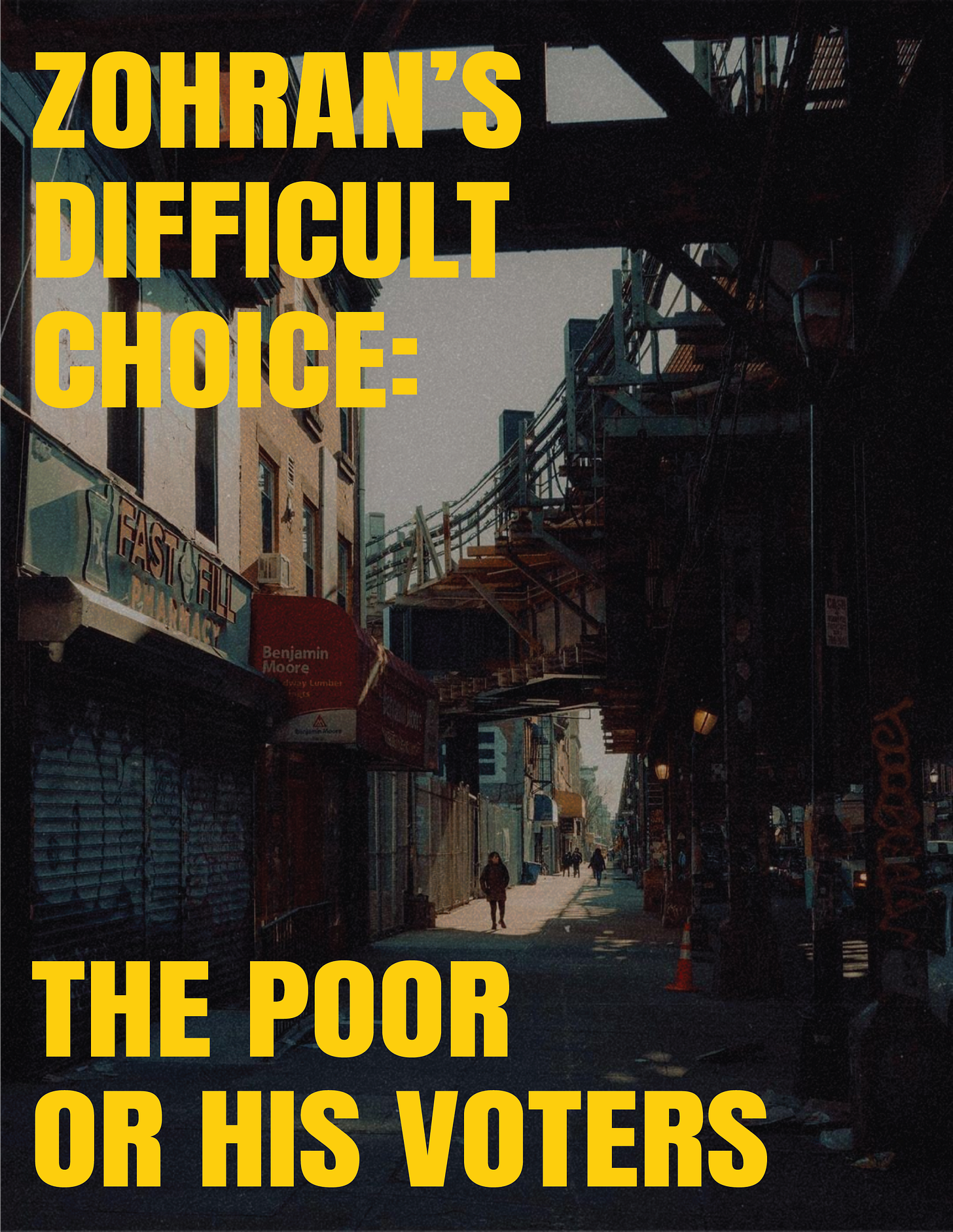Zohran’s Difficult Choice: The Poor or His Voters
Zohran Mamdani positions himself as a champion for the poor. I believe him. I believe that he genuinely wants to use his likely new role as mayor to help the least fortunate among us. Here’s the challenge: to keep the political promises he made to his actual voters — who are generally not the poor — he has to enact policies that hurt the poor.
In the Democratic primary, voters from the lowest income communities typically did not support Mamdani. Voters in neighborhoods like Soundview and Brownsville, East New York and Queensbridge supported Andrew Cuomo. Mamdani did well with voters from neighborhoods like Park Slope and Williamsburg, Astoria and Jackson Heights — voters who are predominantly higher income. Those voters identify as extremely progressive and find solidarity with Mamdani’s party — the Democratic Socialists of America (DSA). The problem is, once you get past the rhetoric, the DSA agenda is not all that aligned with the needs of New York’s poorest.
People in low income communities tend to strongly oppose DSA positions like defunding the police or even weakening the police’s ability to do their jobs by eliminating tools like the gang database. Mamdani’s voters typically don’t live in high crime neighborhoods, but they often feel strongly that the NYPD should be limited in its resources and reach. Especially in Mamdani’s first year, where he will face a budget deficit that could reach $6 billion, hard choices will have to be made about every agency. The NYPD has the third largest budget of any agency. DSA supporters will argue that cutting the NYPD’s budget is far more important than cuts to other agencies and programs. People most impacted by crime tend to feel otherwise.
The same is true for taxes. Mamdani has pledged to seek an increase in both the corporate tax rate and the individual income tax rate. While the poorest New Yorkers have no sympathy for the 1%, if you are very poor and you need social services like Medicaid, like public assistance, like public housing, you ultimately just want the City to have as much money as possible to spend on those programs.
A recent Citizens Budget Commission report found that New York City’s share of America’s millionaires dropped from 12.7% in 2010 to 8.7% in 2022. Had New York simply maintained its share of the highest taxpayers, the State and City could have collected $13 billion more in revenue in one year alone. That’s enough to cover the entire deficit and pay for all of Mamdani’s child care plan and for free buses and invest more in affordable housing. If you are among the lowest income New Yorkers, imposing higher taxes on the highest earners to achieve social justice while then having to cut funding for social services as a result is not in your interest.
But Mamdani’s voters strongly favor raising taxes on the 1%? Why? Because it’s punitive and that’s the point. The people in the 80th% don’t hate the 1%. They don’t even think about them. They’re too busy trying to pay the rent and put food on the table. You know who really hates the 1%? The 8th percent, the 13th percent, the 19th percent. They are angry and they want justice. They see Mamdani as their way to get it.1
A conventional politician would make the conventional choice — cater to the base. As Bill de Blasio learned, having low poll numbers overall doesn’t matter if the people you need to turn out in the next primary still like you.2 But that comes at the expense of serving the people you say you care about the most.
Mamdani has the chance to transcend that. I think he has it in him to make the unconventional choice and choose what’s simply best for those who need the help the most. But that will alienate some of his key supporters and it will make his job harder politically. It doesn’t matter. At the end of the day, if the city truly feels like it’s in good shape, the voters will give you another term, regardless of how you got there or what your original platform was.
Mamdani’s big ideas — free child care, free buses, a rent freeze, City-owned grocery stores — are not at all mutually exclusive with maximizing public safety, maximizing absolute tax revenue and providing sound operations. The two can go hand in hand. But doing so will require him to often say no to the forces that got him here. Let’s hope he has the fight in him to do it.
Just like many Republicans see Trump as a way to get it against the people they resent.
Especially if no other aspirants to the job realize that you’re beatable and have the courage to go for it.



By which other means could Mamdani pay for his proposed social programs other than increasing taxes for this cohort?